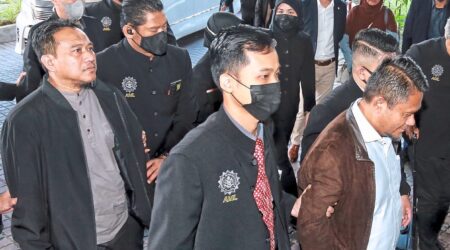In Malaysia, a major condom producer, why are people coy about discussing safe sex?

When freelance IT professional Saiful Nizam Abdul Wahab, 42, was growing up in Malaysia, he recalls learning about sexual reproduction during religious and science classes.
But the lessons were not “comprehensive or holistic”, Saiful said, as they did not cover all aspects of sexual relationships such as consent and mutual respect.
He believes education authorities and religious authorities in the Muslim-majority country should advocate the importance of sex education as it is vital to give “good” early guidance to youngsters, who are exposed to a range of influences online and in the mass media.
Parents can also have honest conversations with their children, he said.
“In general our community, especially the Malay-Muslim community, is not used to talking about sex openly,” he said.
Good guidance “can guide the child from making mistakes and … possibly making wrong decisions later in life”, said Saiful, who is the father of Ain Husniza, a 17-year-old student who made headlines in April after calling out on TikTok a teacher’s joke about rape.
Ain and Saiful are facing a defamation lawsuit brought by the teacher and have filed a counterclaim against him and education officials.
Saiful’s comments underscore how sex education remains a tricky subject in the conservative country, even though it is home to the planet’s largest manufacturer of condoms and more recently, a start-up that launched the world’s first unisex condom.
Wondaleaf, created by gynaecologist John Tang Ing Ching, has a simple purpose – to keep vulnerable areas during sexual intercourse appropriately covered, helping to reduce accidental pregnancies and sexually transmitted infections (STIs).
Tang, the managing director of medical supplies firm Twin Catalyst, said the government, private sector and non-governmental organisations should work together to foster more open and mature dialogue on how to solve unwanted repercussions of sexual intercourse.
He said it was important to dispel the myths and stigma surrounding the subject of safe sex.
For example, a common myth in Malaysia is that comprehensive sex education, not just a few modules in school, will fuel promiscuous sexual behaviour among young people. Another common myth is that teaching abstinence will ensure young people do not engage in sexual activity.
“Conversations cannot happen unless the stigma is removed first,” Tang said, also noting that sex education challenges are not unique to Malaysia.
Children in Malaysia have been taught sex education in school since 1989, with modules on the topic introduced to secondary school students initially, followed by younger pupils in 1994.
But the public is discouraged from having open conservations on sex and sexuality – in 2012, Malaysian officials ordered book shops to seize copies of a sex education book by British author Peter Mayle.
Where did I come from?, first published in 1973, was said to have been banned by the government for distributing “elements that undermine societal morals and public interests”.
Still, Malaysia faces a higher rate of teenage pregnancy than neighbouring economies. Official figures from 2015 showed one-quarter of about 18,000 teenage pregnancies in Malaysia were out of-wedlock pregnancies. The data also showed that around 14 in 1,000 underage girls in Malaysia get pregnant annually compared to four in 1,000 in Singapore and three in 1,000 in Hong Kong, local media reported.
Last year, according to World Bank data, there were 13.41 births per 1,000 adolescent women aged between 15 and 19 in Malaysia, compared to a figure of 82.96 in Bangladesh, where child marriages are common, and 1.38 in South Korea. Malaysian non-profit foundation OrphanCare said it was consistently seeing more than 100 “baby dumping” cases reported to police each year.
Data from Malaysia’s National Population and Family Development Board found the country ranked lowest in terms of using contraception, with 52.5 per cent of people doing so compared to 78.4 per cent in Thailand, followed by Vietnam at 76.6 per cent and Indonesia at 61.3 per cent.
Said Tang, the gynaecologist: “For most of human history, abstinence has been the best way to prevent the spread of sexually transmitted infections or unwanted pregnancies so we created laws, taboos, and cautionary tales to warn people to abstain from sex. In other words, we make it taboo.”
It was possible to take into account “unique and important cultural and religious sensitivities that need to be taken into account during sexual education,” he said.
He has been working closely with the Federation of Reproductive Health Associations of Malaysia, an NGO which distributes condoms and talks to pupils and the public about safe sex. Its chairperson, Kamal Kenny, said advocacy work can only be effective when there is enough awareness of the subject matter.
The public also needs to understand safe sex discussions and know that having such conversations does not translate to promoting sexual activity, he said. Rather, it is about “pragmatically recognising that sex is simply a part of being human, and education surrounding safe sex focuses on the prevention of any unintended consequences”, Kenny said.
Karex, the world’s biggest condom manufacturer based in Malaysia, said the firm also had a role to play.
CEO Goh Miah Keat told This Week in Asia the unisex condom would encourage safe sex practices by all sexes and orientations.
“Condoms have been around for such a long time, many people have developed the preconception that they are uncomfortable to use and generally not interesting or appealing,” he said.
“The responsibility, therefore, falls onto condom manufacturers and brand owners like us to leverage technology to reimagine the product category to offer customers something that feels more natural and exciting.”
Of course, sex education needs to encompass safe sex but also so much more, said women’s health specialist Subatra Jayaraj.
She praised the Wondaleaf condom for “breaking down stigma as it does not only put the onus on one partner to use barrier protection. It also provides options for people with diverse gender identities and sexual orientations”.
Subatra acknowledged that many children were learning about sex from an early age but “educating” themselves online including on pornographic websites was “not the best way to learn”.
Subatra pointed to a comprehensive sexual education (CSE) programme including pregnancy prevention methods and consent and respect, that is being taught in government schools. These lessons are woven into subjects like biology and physical education, ” but it depends whether teachers choose to go through it properly. We need to question if teachers are sufficiently trained on the syllabus too”.
Whether it is parents or teachers speaking up initially, age-appropriate sex education “should start from very early childhood, such as introducing safe touch and consent, and it can be further explored as the child gets older”, Subatra said.
Malaysia has “always had a holier than thou approach” on sex education with some ideas of sin attached to sexuality, although “we are quite explorative sexually in private spheres”, she pointed out.
“We need to decouple sex from judgment and fight the stigma that prevents individuals, especially young people, from accessing sexual and reproductive health information and services before and once they become sexually active.”












Leave a Reply